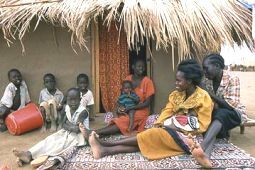Sudanese refugees ponder return to devastated homes following peace treaty
By PAUL GARWOOD, Associated Press Writer
CAIRO, Egypt, Feb 10, 2005 (AP) — Civil war drove Christine Pompeo from her village in Sudan’s deepest south to a crowded apartment in the Arab world’s biggest city.

|
|
Half a million Sudanese refugees, like these in Kakuma camp in Kenya, could go home under the new peace deal for South Sudan. ( UNHCR). |
Now a peace treaty has been struck to end the 21-year war that displaced 4 million, but Pompeo and many others are hesitant about returning.
“There are no jobs in the south, we can’t work on our farms and so many people are suffering. We have no money here but life is safe,” Pompeo says, brushing a tear away during a Cairo church celebration of the Jan. 9 peace treaty signing. “I am worried for my future.”
Pompeo, 30, from a village near the southern city of Juba, is among an estimated 500,000 displaced Sudanese recognized by the United Nations as refugees living in countries bordering Sudan.
They account for a portion of the overall number of Sudanese who left the country during the war, which pitted southern rebels from Christian and animist backgrounds against soldiers of Sudan’s Islamic-oriented government, which is based in the Arab-influenced north.
Unofficial estimates put the number of people who left Sudan during the civil crisis at between 2 million to 4 million. Inside Sudan alone, another 4 million people were displaced, according to the United Nations High Commissioner for Refugees.
The U.N.’s refugee agency, which has long tried to assist Sudanese displaced from the country by the war, is now laying the groundwork for hundreds of thousands of refugees to return.
This weekend, the UNHCR’s deputy high commissioner, Wendy Chamberlin, will start a weeklong trip to southern Sudan, Uganda and Kenya to inspect her agency’s efforts to prepare for the return of southern refugees.
A voluntary repatriation program is a key component of an estimated — and so far unfunded — US$92 million program to attract refugees back to the south. The returnees would help rebuild a region where cities and infrastructure lie decimated and little development has taken place during two decades of fighting, which left more than 2 million people dead either from violence or war-related famine.
The first batches of southern Sudanese are expected to start returning after June as part of the voluntary repatriation program. UNHCR says it desperately needs more international donations to prepare for their return.
In 2004, the agency requested nearly US$30 million (A?23.51 million) in funding for southern Sudan but received just US$6 million (A?4.7 million). For 2005, the agency says it needs US$62 million (A?48.58 million), but so far no contributions have come in.
Without such help, UNHCR officials acknowledge that many refugees _ including thousands who had pinned hopes on migrating to another country like the United States or Australia _ will be hard pressed to return to a home offering little immediate hope.
“Southern Sudan in its present condition is so poor and lacks so much infrastructure. Not all the refugees will be rushing to return,” says Javier Lopez, the UNHCR’s acting deputy representative for operations in the Sudanese capital, Khartoum. “Refugees returning don’t know what they are going to find because they’ve been living outside for so long. They will probably find nothing and feel their lives in places like Cairo are much better.”
Of the 500,000 recognized Sudanese refugees, almost half are living in teeming refugee camps in Uganda. Another 88,000 are in Ethiopia; 69,000 in the Democratic Republic of the Congo; 60,000 in Kenya; 36,000 in the Central African Republic and 30,000 in Egypt.
U.N. officials say several thousand Sudanese who had been living in camps in Uganda and Kenya have started returning on foot to their villages since the Jan. 9 peace treaty signing. In some cases, bombs or looting have destroyed the homes they left behind. In others, refugees are returning to find their land being used by strangers who remained.
The UNHCR’s Cairo-based assistant regional representative, Damtew Dessalegne, says while many refugees returning to southern Sudan after years of exile will be greeted by unemployment, war-destroyed homes or strangers living on their land, their involvement is crucial in their region’s rebuilding.
“Many have the knowledge and the skills necessary to rebuild their communities,” he said.
One southern refugee living in Cairo, Boutros Akot Monot, believes most of his countrymen will heed the call to return.
“There are many problems in southern Sudan but people are hoping to return to improve it,” 30-year-old Monot said. “There is nothing like our own country.”
